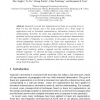Free Online Productivity Tools
i2Speak
i2Symbol
i2OCR
iTex2Img
iWeb2Print
iWeb2Shot
i2Type
iPdf2Split
iPdf2Merge
i2Bopomofo
i2Arabic
i2Style
i2Image
i2PDF
iLatex2Rtf
Sci2ools
141
click to vote
IJCNLP
2005
Springer
2005
Springer
Using Multiple Discriminant Analysis Approach for Linear Text Segmentation
Research on linear text segmentation has been an on-going focus in NLP for the last decade, and it has great potential for a wide range of applications such as document summarization, information retrieval and text understanding. However, for linear text segmentation, there are two critical problems involving automatic boundary detection and automatic determination of the number of segments in a document. In this paper, we propose a new domain-independent statistical model for linear text segmentation. In our model, Multiple Discriminant Analysis (MDA) criterion function is used to achieve global optimization in finding the best segmentation by means of the largest word similarity within a segment and the smallest word similarity between segments. To alleviate the high computational complexity problem introduced by the model, genetic algorithms (GAs) are used. Comparative experimental results show that our method based on MDA criterion functions has achieved higher Pk measure (Beeferma...
Criterion Functions | IJCNLP 2005 | Linear Text Segmentation | Natural Language Processing | Word Similarity |
Related Content
| Added | 27 Jun 2010 |
| Updated | 27 Jun 2010 |
| Type | Conference |
| Year | 2005 |
| Where | IJCNLP |
| Authors | Jingbo Zhu, Na Ye, Xinzhi Chang, Wenliang Chen, Benjamin K. Tsou |
Comments (0)

